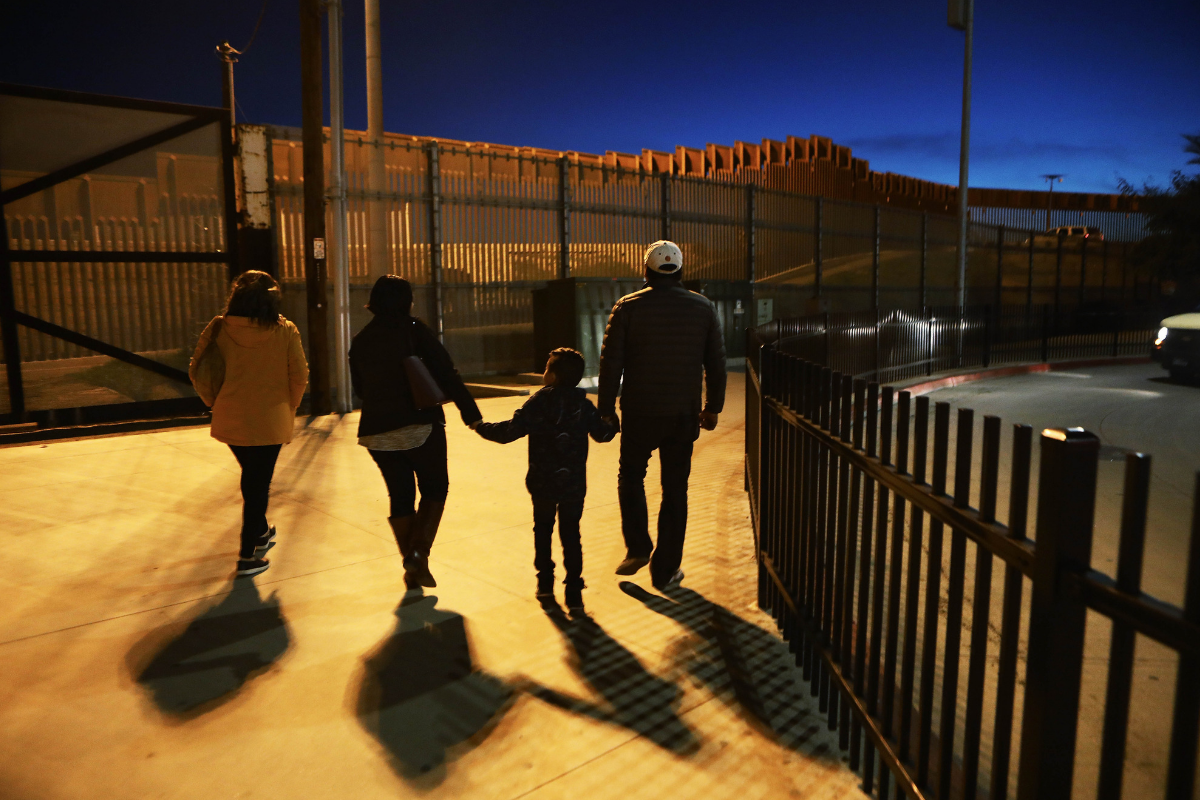

People walk on a sidewalk on the U.S. side of the U.S.-Mexico border barrier on January 25, 2019 in San Diego, California.(Photo by Mario Tama/Getty Images)
SAN DIEGO, CA — The Mexican government is protesting a unilateral move by the United States that will send asylum seekers back to Mexico to wait while their cases are going through the courts. Although the government of Andrés Manuel López Obrador has been clear that foremost will be respecting human rights of all migrants within its territory, the sovereign nation does not agree to the arbitrary decision that the U.S. has been attempting to assign Mexico as a third country for migrants to wait in while their asylum cases are processed.
While some media outlets reported —and U.S. officials have indicated— there was consent and collaboration from the Mexican government, Roberto Velasco, spokesman for the Mexican Foreign Affairs Secretariat made clear there was not. He did so while stating that the Mexican government absolutely would have had to agree to an announcement from the U.S. to place Mexico in the position of third country for asylum seekers to wait. Still, the U.S. launched the move through a pilot program starting in San Diego last Friday.
Thousands of migrants are already waiting in Tijuana, delayed by the Trump Administration’s blocking of the usual flow of asylum processing at a U.S. port of entry. Now, this pilot program is rolling out, beginning across the border in San Diego, California at the San Ysidro port of entry. As of this publication, there had been no return of asylum seekers currently waiting in the U.S. as threatened by the U.S. government. Mexico is preparing and vigilant. Concerns continue to grow about the U.S. government’s continued disregard for asylum laws.
“Forcing asylum-seekers to wait in Mexico while their claims are processed is just the latest of the Trump administration’s cruelly anti-immigrant tactics that are fundamentally at odds with our values and our nation’s commitment to provide refuge to people fleeing violence and persecution,” said Chicana activist, grassroots organizer and Executive Director of the ACLU of San Diego and Imperial Counties Norma Chávez-Peterson in a statement. “Over the past several weeks, the Department of Homeland Security has been abandoning vulnerable asylum-seeking families on the streets of San Diego at the rate of up to 100 people a day. Now, it wants to prevent them from remaining in U.S. to await their scheduled asylum hearings. This new tactic exacerbates the already unacceptable circumstances the Trump administration has created for thousands of other migrants by illegally rejecting asylum seekers at our ports of entry.”
Astrid Dominguez, Director of the ACLU Border Rights Center, had this reaction:
“Returning these families, many with children, to Mexico offends due process and endangers lives. People fleeing violence and persecution in their home countries have a legal, human right to seek asylum in the United States, including at the San Ysidro, California port of entry, where this pilot program will take place. Denying asylum seekers this right is fundamentally un-American, jeopardizes the health and safety of vulnerable populations, and further exemplifies the Trump administration’s racist and inhumane approach to our border. The crisis at the U.S.-Mexico border was created by President Trump and he is intentionally doubling down.”
The San Diego Rapid Response Network is mobilizing this week for an action at the San Diego County Board of Supervisors to urge board members to designate the old abandoned downtown courthouse as a shelter for housing men women and children who have been released from detention. Over the last few months, from October to January 1, 5,200 individuals were assisted at the shelter which has had to move several times and the current shelter must be vacated by February 15. The response network states the old courthouse would be a perfect site.
The situation with shelter capacity to accommodate migrants and asylum seekers in Tijuana is another ongoing challenge for humanitarians and the call is out to both governmental and non-governmental agencies as well as human rights organizations across the globe to please not let the situation happening in this region out of the sight of observers and people of good conscience.
There is no doubt that this latest policy is an extension of an ongoing assault on the humanity of a people who have long suffered the repercussions of imperialist interventions in Central America which is where the majority of the asylum seekers are coming from in the latest waves of these caravans. With what is happening in other Latin-American countries at this time, and as more people continue fleeing in search for their wellbeing, we cannot reject the due process rights that have been set up for asylum seekers. Donald Trump’s administration received notice from the United Nations to not reject asylum seekers and his response was to send 5,000 troops to the border.
Some people think that accusations of tyranny should be reserved or spoken with caution. I am not one to mince words.
**
Mexican-born Sara Gurling is a trade unionist with more than 20 years representing workers rights and serves as a Labor Representative with the California Nurses Association/National Nurses United. She was the Director of Organizing with the American Civil Liberties Union (ACLU) of San Diego and is known primarily as a humanitarian pro-justice labor organizer, immigrant rights activist and labor studies college teacher. She is also the president emeritus of Border Angels. Her journalistic radio and print work is featured in the United States and Mexico.


